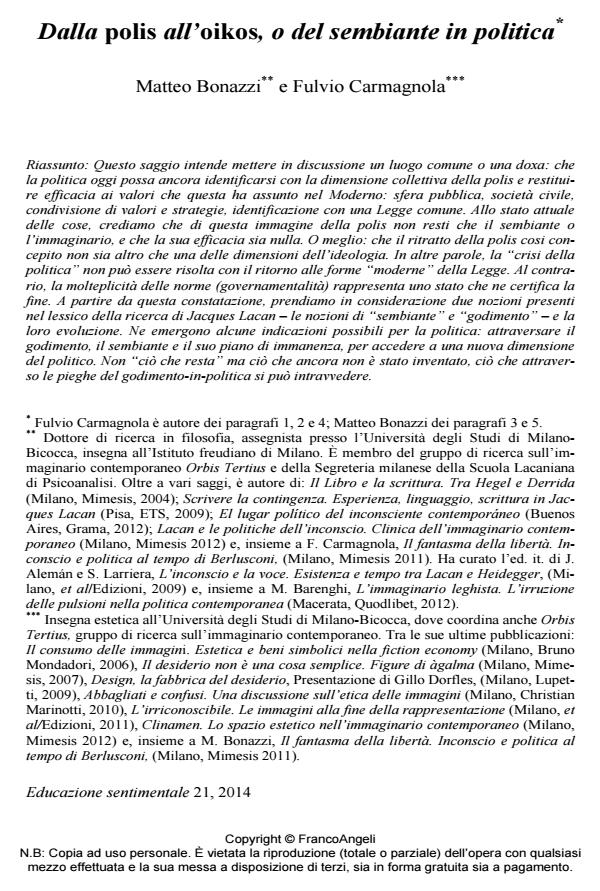Dalla polis all’oikos, o del sembiante in politica
Journal title EDUCAZIONE SENTIMENTALE
Author/s Matteo Bonazzi, Fulvio Carmagnola
Publishing Year 2014 Issue 2014/21 Language Italian
Pages 14 P. 109-122 File size 676 KB
DOI 10.3280/EDS2014-021010
DOI is like a bar code for intellectual property: to have more infomation
click here
Below, you can see the article first page
If you want to buy this article in PDF format, you can do it, following the instructions to buy download credits

FrancoAngeli is member of Publishers International Linking Association, Inc (PILA), a not-for-profit association which run the CrossRef service enabling links to and from online scholarly content.
From polis to oikos, or of the countenance in policy. This essay wants to call into question a cliché or a doxa. That today policy can still identify itself with the collective dimension of the polis and return efficacy to the values that it has taken from the Modern: the public sphere, the civil society, the shared values and strategies, the identification with a common law. At the state of things, we believe that only the countenance and the unconscious remain of this image of the polis and that its effectiveness is zero. Or better, that the portrait of the polis thus conceived is nothing more than one of the dimensions of the ideology. In other words, the "crisis of policy" can not be resolved by returning to the "modern" forms of the Law. On the contrary, the multiplicity of the regulations (governmentality ) represents a state that certifies its end. Starting from this verification, we consider two concepts in the research lexicon of Jacques Lacan - the notions of "countenance" and "enjoyment" - and their evolution. Some possible indications for policy rise from this: cross the enjoyment, the countenance and his plan of immanence, to enter a new political dimension. Not "what remains" but what has not yet been invented, what can be perceived through the folds of the enjoyment-in-policy.
Keywords: Oiko-nomia, countenance, enjoyment, end of the symbolical, governmentality, drive economy, tyche, plan of immanence
- Agamben G. (2002). L’aperto. L’uomo e l’animale. Torino: Bollati Boringhieri.
- Agamben G. (2011). Altissima povertà. Regole monastiche e forma di vita. Vicenza: Neri Pozza.
- Barenghi M. e Bonazzi M., a cura di (2012). L’immaginario leghista. L’irruzione delle pulsioni nella politica contemporanea. Macerata: Quodlibet.
- Bonazzi M. e Carmagnola F. (2011). Il fantasma della libertà. Inconscio e politica al tempo di Berlusconi. Milano: Mimesis.
- Bonazzi M. (2012). Lacan e le politiche dell’inconscio. Clinica dell’immaginario contemporaneo. Milano: Mimesis.
- Deleuze G. (1990). Poscritto sulle società di controllo. In: Pourparler, 1972-1990. Macerata: Quodlibet, 2000.
- Deleuze G. (2002) Sulla morte dell’uomo e il superuomo. In: Foucault. Napoli: Cronopio.
- Derrida J. (1997). La différance. In: Margini della filosofia. Torino: Einaudi.
- Lacan J. (1966). Il tempo logico e l’asserzione di certezza anticipata. In: Contri G. a cura di, Scritti, Vol. I. Torino: Einaudi, 1974.
- Lacan J. (1966). Funzione e campo della parole e del linguaggio in psicoanalisi. In: Scritti, cit. Vol. I. Torino: Einaudi, 1974.
- Lacan J. (1966). Soggetto e desiderio nell’inconscio freudiano. In: Scritti, cit. Vol. II. Torino: Einaudi, 1974.
- Lacan J. (2007). Il Seminario, Vol. XVIII. Di un discorso che non sarebbe del sembiante, 1971. Testo stabilito da J.-A. Miller. Ed. It.: Di Ciaccia A. a cura di. Torino: Einaudi, 2010.
- Latour B. (1991). Non siamo mai stati moderni. Giorello G., presentaz. Ed. It. Milano: Eleuthera, 1995.
- Nancy J.L. (1990). La comunità inoperosa. Napoli: Cronopio, 1995.
- Platone (2000). Simposio. Reale G., a cura di. Milano: Bompiani.
- Ronchi E. (2012). Come fare. Milano: Feltrinelli.
- Salvati M. (2013). La modernità inafferrabile. In: La lettura, 11 agosto.
- Sini C. (2008). Da parte a parte. Apologia del relativo. Pisa: ETS.
- Zizek S. (1997). La trasgressione intrinseca. In: Senaldi M, a cura di, L’epidemia dell’im-maginario. Roma: Meltemi, 2004.
- Zizek S. (2000). Il godimento come fattore politico. Cantone D. e Scheu R., trad. it. a cura di. Milano: Cortina, 2001.
Matteo Bonazzi, Fulvio Carmagnola, Dalla polis all’oikos, o del sembiante in politica in "EDUCAZIONE SENTIMENTALE" 21/2014, pp 109-122, DOI: 10.3280/EDS2014-021010